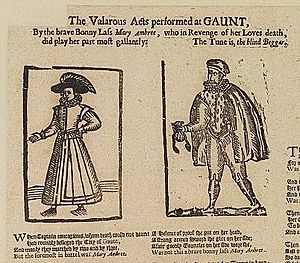Mary Ambree facts for kids
Quick facts for kids
Mary Ambree
|
|
|---|---|

An illustrated ballad telling the story of Mary Ambree
|
|
| Years active | fl. 1584 |
| Known for | military captain who inspired songs and stories |
Mary Ambree (active around 1584) was a brave English army captain. She came from Antwerp and helped free the Belgian city Ghent during a war against Spain. Even though history books don't talk much about her, she became famous through songs called ballads and was mentioned in many stories starting in the 1620s. One song about Mary Ambree was super popular in the 1600s!
In 1584, the Spanish army took over Ghent. Captain Mary Ambree, along with other volunteers from the Netherlands and England, fought to free the city. People said she was fighting to get revenge for her boyfriend, Sir John Major. He was a sergeant major who died during the fight for Ghent.
A professor named Dianne Dugaw, who studies English and folklore, thinks the story of Mary Ambree started around 1590. This is because a song about her was listed on song sheets from that year. Professor Dugaw believes this song was originally a "news song." These songs told people about important things happening at the time.
Mary Ambree's Story Lives On
Mary Ambree was a very popular topic for ballads during the 1600s, starting in the 1620s. She was also mentioned in many books, plays, and by different writers and artists. Because she was so well-known, Mary Ambree became a symbol of women who dressed up as men to fight or do other brave things.
- One famous ballad about her was called "The valorous acts performed at Gunt by the brave bonnie lass Mary Ambree, who in revenge of her lovers death did play her part most gallantly. The tune is, The blinde beggar, &c." This song was saved by Thomas Percy in a collection of old papers.
- This ballad even gave the title to Rudyard Kipling's famous book, Captains Courageous.
- The first lines of this ballad are also quoted in a play called The First Part of the Return from Parnassus.
- In the book Sowing Glory by P.C. Wren, a brave French woman soldier was called Mary Ambree. This was a fake name used to keep her real identity a secret.
- Mary Ambree is mentioned in the play The Scornful Lady.
- Some people think that "English Mall," a character mentioned by Samuel Butler (poet) in his poem Hudibras, might have been Mary Ambree.
- The famous writer Ben Jonson mentions Mary Ambree in his plays Epicœne, or The Silent Woman and The Fortunate Isles.
- Jonathan Swift also mentions Mary Ambree in his book A Tale of a Tub.
 | Mary Eliza Mahoney |
 | Susie King Taylor |
 | Ida Gray |
 | Eliza Ann Grier |

